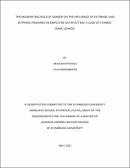| dc.contributor.author | Nyesiga, Reagan | |
| dc.date.accessioned | 2022-03-15T10:32:30Z | |
| dc.date.available | 2022-03-15T10:32:30Z | |
| dc.date.issued | 2021-05 | |
| dc.identifier.citation | Nyesiga, Reagan (2021). The moderating role of gender on the influence of extrinsic and intrinsic rewards on employee satisfaction: a case of Stanbic-bank Uganda.Kyambogo University(Unpublished work) | en_US |
| dc.identifier.uri | https://kyuspace.kyu.ac.ug/xmlui/handle/20.500.12504/868 | |
| dc.description | xiii,71 p. | en_US |
| dc.description.abstract | The study sought to examine the moderating role of gender on the influence of extrinsic and intrinsic rewards on employee satisfaction at Stanbic-Bank Uganda. The specific objectives of the study were; (i) to examine the effect of extrinsic rewards on employee satisfaction at Stanbic Bank Uganda, (ii) to establish the effect of intrinsic rewards on employee satisfaction at Stanbic Bank Uganda, (iii) to establish the effect of extrinsic rewards on employee satisfaction at Stanbic Bank is moderated by gender and (iv) to examine the effect of intrinsic rewards on employee satisfaction at Stanbic Bank is moderated by gender. The study adopted four hypotheses that were tested based on the objectives. The study was guided by two theories of Herzberg’s Two Factor Theory and Abraham Maslow’s Hierarchy of Needs Theory. The study used a case study design where both quantitative and qualitative data was collected from a sample of 169 employees of the bank who were randomly selected using simple random sampling method. The study performed linear regression to address study objectives (i) and (ii) while hierarchical regression analysis was performed to address the study objectives (iii) and (iv). Findings revealed that both extrinsic and intrinsic rewards had a significant effect on employee satisfaction. The study revealed that whereas intrinsic rewards had significant effect on employee satisfaction, extrinsic rewards had no significant effect on employee satisfaction when moderated by gender. The study therefore recommended bank management to consider equitable distribution of extrinsic rewards such as fair pay, bonuses and allowances to all employees regardless of gender differences and the need to put much focus on driving internal satisfaction of male employees through assigning challenging tasks and more additional responsibilities to male employees than female employees. | en_US |
| dc.language.iso | en | en_US |
| dc.publisher | Kyambogo University(Unpublished work) | en_US |
| dc.subject | Employee satisfaction | en_US |
| dc.subject | Banks | en_US |
| dc.subject | Stanbic bank | en_US |
| dc.subject | Uganda | en_US |
| dc.subject | Extrinsic and Intrinsic rewards | en_US |
| dc.subject | Gender | en_US |
| dc.title | The moderating role of gender on the influence of extrinsic and intrinsic rewards on employee satisfaction: a case of Stanbic-bank Uganda | en_US |
| dc.type | Thesis | en_US |

